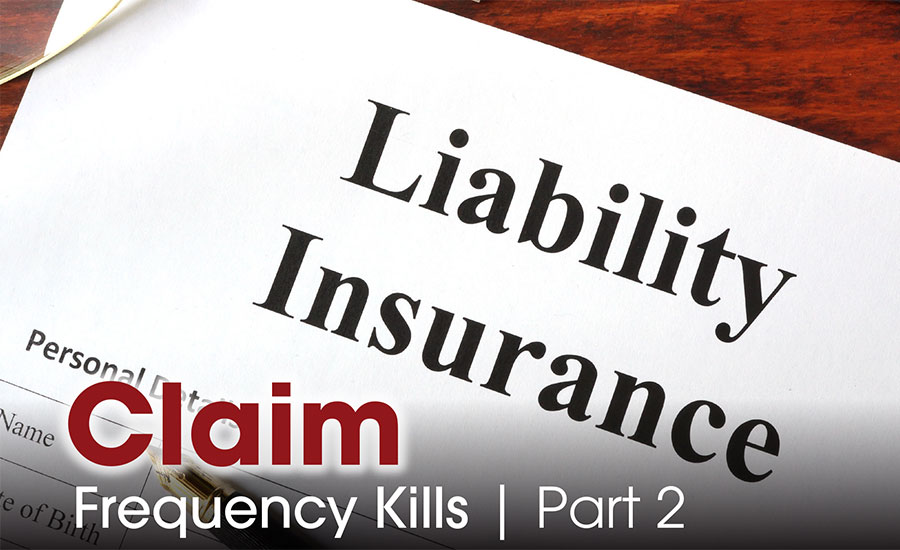Claim Frequency Kills | Part 2
How a few insurance claims can make your restoration company uninsurable.

Editor’s Note:
In part one of this series which was featured in the July issue, Dave explained the challenges of when to make a claim – and when not to, to avoid having too many claims on your policy. This month, he continues to explain how a few claims can make your restoration company uninsurable – and how to avoid that problem.
Last month, we talked about the issue with claims frequency. However, I don’t want any of this information to scare you away from making a claim when you need to. In this article, you’ll find a list of situations that should always be reported as a claim. This is by no means an exhaustive list or a rulebook on what to report and what not to report. You should always reference your specific policy documents for conditions, duties, and requirements imposed on you as a policyholder and it’s a good idea to chat with your insurance agent on what to do. If you selected your insurance agent solely based on the cheapest coverage available in the marketplace, I would get an opinion from someone else on when to submit a claim under your insurance policies.
As a quick reminder, a general liability policy insures against claims for damages alleging bodily injury and property damage and provides defense coverage. The basic insuring agreement of most GL policies, which states the intentions of the insurance and what it will cover, says that the insurance company “will pay those sums that the insured becomes legally obligated to pay as damages because of “bodily injury” or “property damage” to which this insurance applies.” So, if the claim is not for causing bodily injury or property damage, the GL policy likely does not provide coverage. For example, a contract dispute for monetary damages would be a loss that would not normally be covered under a GL policy. It is best to only report claims on a GL policy that are covered under the policy. For example, it is pointless to report an auto claim or a claim for exposure to Category 3 water on a GL policy. The GL policy excludes these losses, but the claims record will show reported losses for years into the future.
What to Report to Your Liability Insurance Company
Bodily injury is a broad term and can vary from physical injury like a broken bone to illness or disease such as asthma, all the way to death. If any person makes an assertion against your firm for some kind of bodily injury, you should notify your insurance representative, such as your insurance agent, and be sure to put your insurance company on notice. Likewise, if you receive notice that someone is suing you or going to sue you for causing Bodily Injury or Property Damage, report that as a claim to your GL insurance company.
Claims alleging that you contaminated something need to be reported to the Contractors Pollution insurance company. Any exposure to asbestos or lead needs to be reported as these routinely develop into high six figure claims.
Expensive damage to a customer’s property that is NOT the property you worked on should be reported. General Liability insurance is not a customer satisfaction warranty. Almost all GL policies contain Damage to Property exclusions that preclude coverage for (1) property damage to real property you worked on if the property damage arises out of your operations or (2) any property damage to property that must be restored, repaired, or replaced because your work was completed incorrectly. There is also a separate Damage to Your Work exclusion and Damage to Impaired Property or Property Not Physically Injured exclusion. So, basically if the problem at one of your job sites could be cured by redoing your work, there is likely no coverage on a GL policy.
As a general rule of thumb, if the alleged damages involve you fixing your work, it is unlikely that a General Liability insurance policy will provide any coverage because of the common business risk exclusions mentioned above. Having to refinish a floor because you got the color wrong will not be a covered GL loss. In contrast, having to refinish a floor because the tile saw table put a deep gouge in it as the table was dragged from end to end on the floor the contractor was not performing operations on, could be a covered loss for Property Damage to the homeowners’ property.

Proof of Negligence
It is important to note that just because someone says you owe them money for the damages you allegedly caused, does not mean you automatically owe them that money. They need to prove you were negligent. Your GL policy will pay for lawyers to defend you in court. It is good advice never to admit guilt or agree to pay a claim for damages without having your insurance company involved.
It is very common practice for General Liability and Contractors Pollution Liability insurance policies to have deductibles. It is also common practice for insurance buyers and agents to place a high value on lower deductibles. Doing so is basically folly. What good does paying for a lower deductible do if you cannot report small claims? Three reported $500 GL losses in one year are going to mess up the insurance renewal process on the typical $500,000 annual revenue restoration firm. One little-known fact is one of those six insurance companies had as a company directive, for their underwriters to refuse to renew any account that reported a claim in the policy period. That same insurance company offered the very lowest deductibles in the business. You read that right, the company sold low deductibles and then penalized anyone who used them.
It is important never to be non-renewed on an insurance policy. Insurance agents commonly have to answer that question on applications for GL insurance. Answering yes to that question puts a dark cloud over the applicant for an insurance policy. The result is usually increased insurance costs and decreased access to insurance for many years. Therefore, the use of the largest deductible the firm can comfortably handle twice in a year is a good rule of thumb to follow. You cannot use the smaller deductibles anyway, without developing a claims frequency problem.
There are many ways to combat claim issues outside of contacting the insurance company. Implementing effective loss prevention procedures such as mandatory safety rules and protocols at jobsites, having in place responsive complaint handling procedures, and hiring practices and employee sensitivity training are just a few examples of ways to avoid liability claims and assist in keeping your claims frequency down. By following the advice above you can be one of the many contractors who have not had a liability claim on an insurance policy in over 10 years.
It can be a fine line to walk when it comes to reporting a job site dispute as a liability claim or not. Insurance professionals have varying opinions on what and when to report a claim for damages and the advice may change based on who you ask. However, what you don’t want to do is report every customer complaint or job satisfaction issue that could be resolved by fixing your work without involving the insurance company. If you report every little thing, as a potential claim under your liability insurance you end up with a claims frequency problem and the firm becomes uninsurable. When you’re uninsurable, it’s hard to run your business because you can’t get jobs, making it difficult to keep your doors open.
Arron Millonzi the Chief Knowledge officer of ARMR contributed to this article.
Looking for a reprint of this article?
From high-res PDFs to custom plaques, order your copy today!






